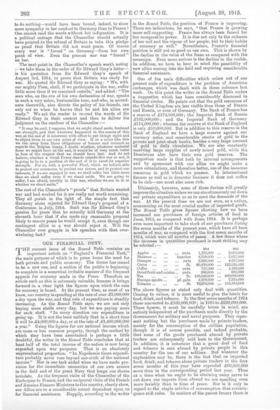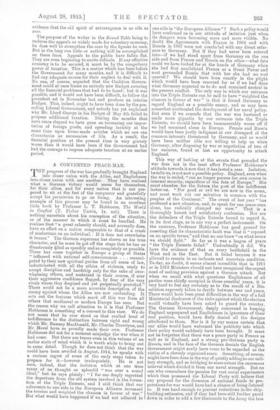OUR FINANCIAL DUTY.
r HE current issue of the Bound Table contains an I_ important article on " England's Financial Task," the main purpose of which is to press home the need for both private and public economy. The theme has ceased to be a new one, and a section of the public is beginning to complain in a somewhat irritable manner of the frequent appeals for economy made in the Press. Therefore an article such as this is extremely valuable, because it brings forward in a clear light the figures upon which the case for economy is based. At the present time, as most of us know, our country is spending at the rate of over £3,000,000 a day upon the war, and that rate of expenditure is steadily increasing. As the Bound Table says, we are not only buying more shells every day, but we are paying more for each shell. "In every direction our expenditure is going up. It is not the least unlikely that in a short time it will be .Q4,000,000 a day, or at the rate of £1,460,000,000 a year." Using the figures for our national income which are more or loss common property, though the method by which tamp have been ascertained is perhaps a little doubtful, the writer in the Bound Table concludes that at least half of the total income of the nation is now being expended upon war purposes. That is an absolutely unprecedented proportion. "In Napoleonic times expendi- ture probably never rose beyond ono-sixth of the national income." Nor is our task ended when we have made pro- vision for the immediate necessities of our own armies in the field and of the great Navy that keeps our shores inviolate. As the frequent visits of the Chancellor of the Exchequer to France, and the reciprocal visits of the French and Russian Finance Ministers to this country, clearly show, our Allies are to a considerable extent dependent upon ,us for financial assistance. Happily, according to the writer in the Bound Table, the position of France is improving. There are indications, lie says, "that France is growing more self-supporting. France has always been famed for her recuperative power. it is due not only to the richness of her soil and the vigour of her people, but to their habits of economy as well." Nevertheless, France's financial position is still not so good as our own. This is shown by the decline in the value of the franc as compared with the sovereign. Even more serious is the decline in the rouble. In addition, we have to bear in mind, the possibility of new allies coming into the field and requiring, considerable financial assistance.
One of the main difficulties which arises out of our present scale of expenditure is the problem of American exchanges, which was dealt with in these columns last week. On this point the writer in the Bound Table makes a suggestion which has been considerably discussed in financial circles. He points out that the gold resources of the United Kingdom are less visible than those of Franco and Russia, or even of Germany. The Bank of France has a reserve of .Q174,000,000; the Imperial Bank of Russia £162,000,000; and the Imperial Bank of Germany £114,000,000; whereas the reserve at the Bank of England is only .£69,000,000. But in addition to this reserve in the Bank of England we have a large reserve against our currency notes, and considerable stocks of gold in the private and joint-stock banks, besides a very large amount. of gold in daily circulation. We are also constantly receiving large supplies of newly mined gold, while the Dominions also have their own gold reserves. The suggestion made is that both by internal arrangements and by agreement with our allies we might make a more ostentatious, and therefore better, use of the immense resources in gold which we possess. In international finance as well as in domestic business it does not suffice to be rich—one must also seem rich.
Ultimately, however, none of these devices will greatly improve the situation unless we can simultaneously cut down our private expenditure so as to meet the demands of the war. At the present time we are not even, as a nation,. economizing on the most crucial matter of imported goods. The Round Table gives figures showing how we have increased our purchases of foreign articles of food in June, 1915, as compared with June, 1914. It is perhaps even more important to take stock of our purchases during the seven mouths of the present year, which have all been months of war, as compared with. the first seven months of 1914, which wore all months of peace. A few items where the increase in quantities purchased is most striking may be selected :—
1015
2,003,000 5,027,000 4.637,000' 122,031,000 1,136,000 625,000 200,000,000 7,321.,000 113,581,000
The above figures as stated only deal with quantities. Coining to values, it is most useful to give the totals for food, drink, and tobacco. In the first seven months of 1914 these amounted to £160,000,000; in 1916 to £220,000,000. These figures, it must be carefully borne in mind, are entirely independent of the purchases made directly by the Government for military and naval purposes. They repre- sent nothing but the purchases made by private traders, mainly for the consumption of the civilian population, though it is of course possible, and indeed probable, that some of the goods purchased abroad by private traders are subsequently sold here to the Government In addition, it is notorious that a great deal of food and tobacco is sent abroad by private people in this country for the use of our soldiers. But whatever the explanation may be, there is the fact that on imported food, drink, and tobacco alone private traders in the first seven months of this year have expended X60,000,000' more than in the corresponding period last year. Thus at a time when we ought to be straining every nerve to cut down our imports from abroad wo are spending even more lavishly than in time of peace. Nor is it only ia regard to the staple articles of consumption that extrava- gance still rules. In matters of the purest luxury there is:
Apples ... ... ow ts.
Bananas ... Oranges ... bunches
Cocoa ... ■•• C/V ts
lb.
Coffee cwts.
Dried fruit and raisins... cwts.
Tea lb.
Foreign spirits ... pf. gals. Tobacco ... lb.
1,014
1,172,000 ...
4,708,000 ...
3,690,000' 60,490,00G ...
757,000 ...
386,000 ...
158,000,000 ...
5,270,000 79,970,000 ,.,
evidence that the old spirit of extravagance is as rife as ever.
The purpose of the writer in the Round Table being to endorse the appeals so widely made for voluntary economy, he does well to strengthen the case by the figures he uses. But in the long run little or nothing will be accoruplished on these lines. Appeals to the public have fallen flat. They are even beginning to excite ridicule. If any effective economy is to be secured, it must be by the compulsory power of taxation. This is a matter which has been before the Government for many months, and it is difficult to find any adequate excuse for their neglect to deal with it. No one, of course, expected that the Coalition Govern- ment could at once frame an entirely new Budget covering all the financial problems that bad to be faced ; but it was possible, and it would not have been difficult, to follow the precedent sot in November last and produce an interim Budget. This, indeed, ought to have been done by the pre- ceding Liberal Government, and nobody has yet explained why Mr. Lloyd George in his Budget of May 4th failed to propose additional taxation. During the months that hare since elapsed we have gone on increasing our impor- tation of foreign goods, and spending lavishly at the same time upon home-made articles which no one can characterize as necessaries of life. As a result, the financial position at the present time is very gravely worse than it would have been if the Government had had the courage to impose adequate taxation at an earlier period. •



































 Previous page
Previous page